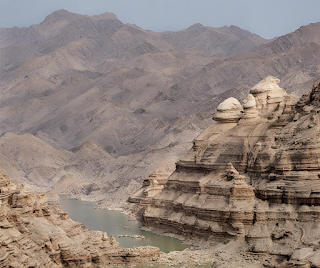Rajasthan geology with rock types and occurrence of minerals
Rajasthan, a state in north-western India, has a diverse geology with a wide range of rock types and mineral occurrences.

Here's an overview of the geology, major rock types, and the occurrence of minerals in Rajasthan:
1. Aravalli Range:
- The Aravalli Range, one of the oldest mountain ranges in the world, extends through Rajasthan. It consists of Precambrian rocks, including gneiss, schist, and quartzite.
- This region is known for its rich mineral deposits, including mica, beryl, and copper.
2. Thar Desert:
- The Thar Desert in western Rajasthan is characterized by extensive sand dunes.
- The region has some sedimentary rock formations, including sandstone and limestone.
- Mineral resources in the Thar Desert include gypsum, phosphorite, and lignite coal.
3. Marwar Supergroup:
- The Marwar Supergroup in western Rajasthan consists of sedimentary rocks such as sandstone, shale, and limestone.
- It hosts important mineral resources like limestone, which is widely used in the cement industry.
4. Vindhyan Super Group:
- The Vindhyan Super Group in south-eastern Rajasthan contains sedimentary rocks, including shale, sandstone, and limestone.
- It hosts mineral deposits such as rock phosphate and dolomite.
5. Malani Igneous Suite:
- The Malani Igneous Suite is a large igneous province covering parts of Rajasthan.
- It consists of basaltic lava flows and associated rocks. These basaltic formations have limited mineral resources but provide fertile soil for agriculture.
6. Precambrian Basement Rocks:
- Beneath the sedimentary cover in many parts of Rajasthan, there are Precambrian basement rocks, including granite and gneiss.
7. Mineral Occurrences:
- Rajasthan is rich in mineral resources, and it is a major producer of various minerals, including:
- Limestone: Rajasthan is known for its high-quality limestone, which is used in the cement, steel, and chemical industries.
- Marble: The state is famous for its marble deposits, and it's a leading producer of marble in India.
- Gypsum: Rajasthan has significant gypsum deposits, which are used in the construction and agricultural sectors.
- Rock Phosphate: The state is a major producer of rock phosphate, an essential raw material for fertilizers.
- Copper: Copper deposits are found in the Khetri Copper Belt in north-western Rajasthan.
- Lead and Zinc: The state has lead and zinc deposits in the Zawar region.
- Mica: Mica deposits are found in parts of Rajasthan.
Rajasthan's geological diversity and mineral wealth make it an important contributor to India's mining and mineral processing industries. The state's geology not only provides valuable minerals but also plays a role in shaping its unique landscape and natural resources. Google Search Engine
Visit Official Home Page





0 Comments